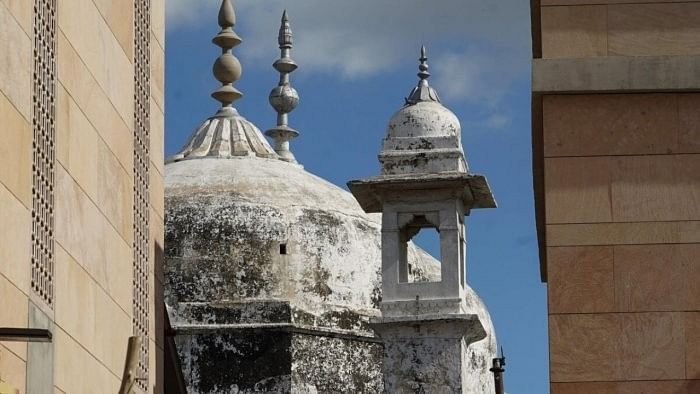
The Gyanvapi mosque.
Credit: PTI File Photo
The Allahabad High Court on Tuesday, continued hearing the Muslim Committee's plea challenging the Varanasi High Court order in the Gyanvapi mosque case.
The HC will continue hearing the matter tomorrow from 10 am.
The Varanasi court had allowed regular worship to be conducted by a 'pujari' nominated by the Kashi Vishwanath temple trust and the petitioner who claimed his grandfather offered puja before the idols in the cellar up to December 1993.
S F A Naqvi, senior counsel for the Mosque committee was asked to prove the side's possession of the mosque in 1993.
"Just show me that you were in possession, I will allow your appeal. Because this is just an interim arrangement. Prima facie it has to be on record that you were in possession of the cellar", said Justice Rohit Ranjan Agrawal as per LiveLaw.
Naqvi's argument that the plaintiff's ancestors 'never approached the court regarding these issues at that time', was shut down by Justice Agrawal.
"That argument goes against you because then that means that they were in possession then and were not aggrieved parties", Agrawal said.
"When they have not done puja since 1968, then where is the question of 1993", said Naqvi pointing it out that the issue of 1993 came out for the first time when the suit was filed by someone else.
"In their suit, there is no whisper of the fact that they are in possession of a cellar etc. When one person's ancestor has relinquished the right earlier, how can now a suit be filed in 2023?", argued Naqvi.
"How will you substantiate your argument that you were in possession of the cellar?", Agrawal asked, to which Naqvi replied saying, "It is there in the objections we have filed."
Agrawal questioned Naqvi over barricading the place. "Once you have admitted to barricading then how was it in your possession?" he asked.
Naqvi argued that barricading prevented either side from taking possession but the southern cellar was a part of the mosque. "It is admitted that after 1993, they didn't have possession either", he said.
Recalling Aslam Bhure's case, Agrawal said, "In Aslam Bhure's case, the SC has said that you protect the property, now when an interim order is passed in judicial proceedings, can it be against the judgment of the apex court? It is not in the administrative proceedings that the order has been passed."
Mohd Aslam Bhure, a resident of Ayodhya, had filed his first contempt plea before the demolition of Babri masjid and two contempt applications after the disputed structure was pulled down on December 6, 1992.
"Their plaint also states the disputed property is not in the possession of the respondents/plaintiffs. The DM violated the order of the Supreme Court in the Aslam Bhure case. How did the DM get to know about the order?", Naqvi replied.
Naqvi also asked whether the district judge had the power to pass the January 31 order without a fresh application considering that the application was disposed of by the January 17 order.
Referring to the objections filed in the Varanasi Court by the Mosque committee, Naqvi said that the Mosque committee has denied that any puja was ever performed by any member of the Vyas family before 1993.
Vishnu Shankar Jain, arguing for the plaintiff, said, "many things were argued before the court, which have not been pleaded in the appeal. The basis of the January 31 order is January 17 which is not challenged before this court."
Agrawal told Jain that the order order was modified on January 31 without any application, to which Jain replied saying, "It was not modified. The second order was passed after hearing both parties."
"I pointed out to the court that the first prayer is allowed (for the appointment of a receiver) but no order had been passed on the second prayer (for allowing Hindu worship rituals in Vyas Tehkhana). No application was necessary", argued Jain.
"Can an order be passed after the application itself is disposed of?", asked Agrawal.
"Power under Section 151 cpc. A discretion had been exercised by the Hon'ble Court. If something is remaining, u/s 151 CPC, court can pass orders", replied Jain.
"In the order, interim relief had been granted to Kashi Vishwanath trust for doing puja in Vyas Tehkhana", said Jain.
Jain argued that his client was in actual possession of the cellar as 'he had possession of the keys'.
"It was within the knowledge of your father but he did not file any amendment in the suit. Now after 31 years what prompted you to file the suit? You have relinquished your rights in favour of the Kashi Vishwanath trust. How is your suit maintainable?", asked Agrawal.
"I am only asking that ultimately when the Kashi Vishwanath trust takes possession, I may also be permitted to perform puja", said Jain
Agrawal asserted that the government is in the position of the Vyas Tehkhana and that that Naqvi is relying on Aslam Bhure.
To which Jain replied saying, "Aslam Bhure does not bar the civil suit. Civil Suits in connected matters have gone up to the SC and no objection has been raised regarding their maintainability in terms of Aslam Bhure."
On February 2, the Allahabad High Court refused to stay Puja rituals being performed in southern cellar of the mosque.
A puja was held in the mosque's southern cellar on Wednesday night, about eight hours after the Varanasi district court order.